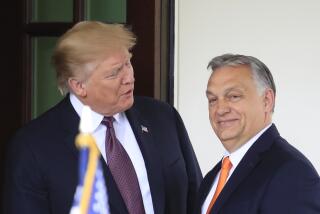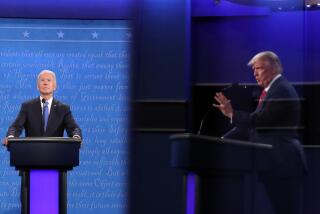Obama-Castro handshake sets stage for historic meeting
- Share via
reporting from Panama City — After a late-night handshake and an exchange of pleasantries, Presidents Obama and Raul Castro were expected Saturday to sit down to an extended face-to-face meeting, the first such encounter between the United States and Cuba in more than half a century.
The highly anticipated meeting follows a telephone conversation earlier this week, in which the two discussed opening of embassies in each other’s countries and other points of “diplomatic normalization,” the White House confirmed Friday.
All told, the widening dialogue represents a historic breakthrough between the two Cold War enemies, showcased here at the Summit of the Americas, a gathering of the hemisphere’s leaders. It is the first year that Cuba has been allowed to attend.
Obama, speaking to a meeting of civil society groups, said improved relations will ultimately help ordinary Cubans.
“As the United States begins a new chapter in our relationship with Cuba, we hope it will create an environment that improves the lives of the Cuban people,” he told the gathering, which included Cuban dissidents. “Not because it is imposed by us, the United States, but through the talent and ingenuity and aspirations, and the conversations among Cubans from all walks of life so they can decide what the best course is for their prosperity.”
Cuba’s inclusion in the summit, which is held every three years, came as a result of pressure from the rest of Latin America and the decision announced in December by Obama and Castro to reestablish diplomatic ties after more than 50 years of enmity.
“Cuba’s participation does signal a new chapter,” said Ben Rhodes, the White House deputy national security advisor.
“We are in new territory here,” he said, alluding both to the phone call and the meeting Thursday night of Secretary of State John F. Kerry and Cuban Foreign Minister Bruno Rodriguez -- the first such meeting, Rhodes said, in 57 years.
Rhodes acknowledged that serious differences remain between the two nations and will continue even after the opening of embassies. The process that would lead to the U.S. removing Cuba from its list of states that sponsor terrorism -- a key demand from Havana -- is advancing but is not complete, he said.
He also criticized Cuban pro-government activists who scuffled with Cuban dissidents this week during a parallel summit for “civil society,” saying such action was “grossly inconsistent with the spirit of dialogue” of the summit and threatened to overshadow the spirit of goodwill that should mark the event.
On the sidelines of the summit and reflecting the deep differences that continue to divide Cuban society, adversaries came to blows over one another’s presence in the parallel meetings, which dealt with democracy, human rights and other social issues.
At odds were an official delegation of Cuban “civil society,” or nongovernmental groups -- although most seem to be from the very governmental Communist Party -- and a collection of dissidents from Cuba and abroad who vehemently oppose the Castro government.
The official delegation protested outside the hotel where the meetings were taking place, blocking entrances and accusing the dissident group of being “mercenaries” and “murderers” on the payroll of the U.S. government.
“Viva Raul!” “Long live Fidel!” they shouted before the television cameras. Then they complained that the dissidents should not be allowed to participate in the conference at all. At several points, the two groups began to scuffle, with fists thrown and police called.
“We are tired of the ... Cubans,” said Sofia Montenegro, a Nicaraguan activist who was also participating. “They want to sabotage everything.”
Eventually, she said, participants sneaked away from the conference rooms, leaving the Cubans behind. Only then, she said, could they agree on various points on the agenda, including the demand that the Organization of American States, a sponsor of the summit, create a mechanism for monitoring democratic progress in Latin American nations.
“We didn’t tell them where we were going,” Montenegro said of the Cubans. “We weren’t going to play along anymore. We left them by themselves.”
Abel Prieto, a close advisor to Raul Castro and head of the Cuban delegation, said the dissident group had no standing and should never have been included in summit events.
“It’s not possible to ask Cuba to dialogue with puppets of these special services agencies in the U.S.,” he told El Nuevo Herald.
Elizardo Sanchez, a leading human rights activist in Cuba not recognized by the government, said the important thing in Panama was being able to sit at the table. Even though that table had to be moved away from the other Cubans here.
The other sideshow has been the presence of Venezuela’s President Nicolas Maduro, who plans to deliver to Obama petitions demanding the American president cancel a recent executive order placing sanctions on seven Venezuelan leaders for alleged human rights abuses and declaring Venezuela a threat to U.S. national security. Maduro also made a point of visiting the El Chorrillo neighborhood, heavily damaged in the 1989 U.S. invasion of Panama, and promising survivors there to take their demands for justice to Obama.
Maduro and Bolivia’s Evo Morales, two of the most prominent leftists attending the summit, skipped the opening gala dinner Friday night.
More to Read
Sign up for Essential California
The most important California stories and recommendations in your inbox every morning.
You may occasionally receive promotional content from the Los Angeles Times.














